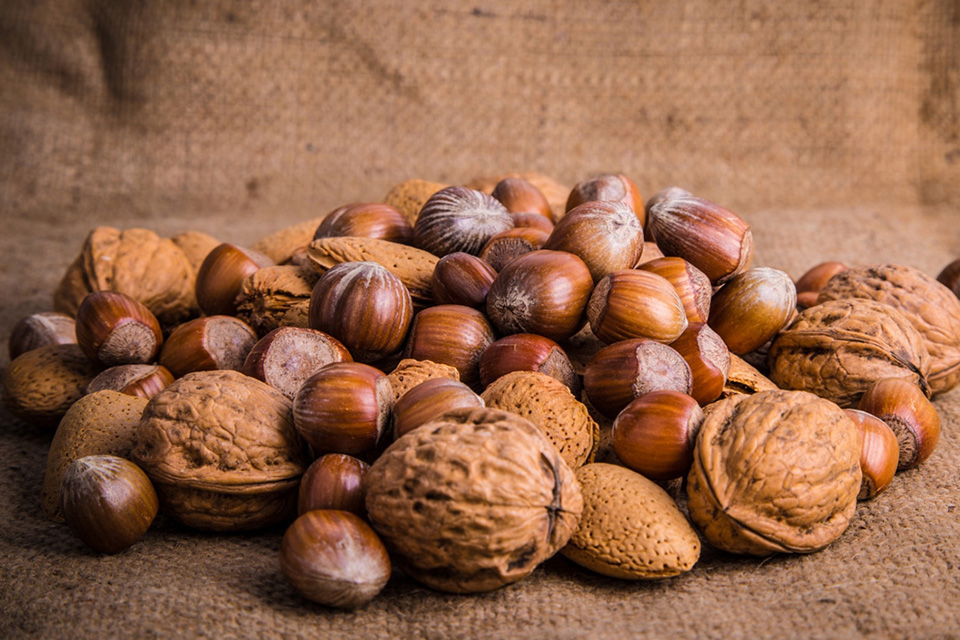Nuts are packed with with heart-healthy fats, protein, vitamins, and minerals.
Protein/Fat/Calories
The lowest-calorie nuts at 160 per ounce are almonds (23 nuts = 6 grams protein, 14 grams fat); cashews (16 to 18 nuts = 5 grams protein, 13 grams fat); and pistachios (49 nuts = 6 grams protein, 13 grams fat).
Ounce for ounce, macadamia nuts (10 to 12 nuts = 21 grams fat, 2 grams protein); and pecans (18 to 20 halves = 20 grams fat, 3 grams protein); have the most calories—200 each—along with the lowest amounts of protein and the highest amounts of fats.
While all nuts contain heart-healthy monounsaturated fats, walnuts (14 halves = about 185 calories, 18 grams fat, 4 grams protein); have high amounts of heart-healthy alpha linoleic acid (ALA), a type of omega-3 fatty acid that reduces inflammation and oxidation.
One ounce of peanuts (28 unshelled nuts = 170 calories,14 grams fat and 7 grams protein). Technically a legume, peanuts are high in folate— making them a great choice for vegetarians, who often need more of this B vitamin. Folate is also essential for brain development and may protect against cognitive decline.
One ounce of Brazil nuts (6 nuts = 190 calories, 19 grams fat, and 4 grams protein). One contains the entire RDA of selenium. They should be eaten sparingly.
Pecans are loaded with beta-sitosterol, a plant steroid that may help relieve symptoms of benign prostatic hyperplasia (BPH), or enlarged prostate. One ounce of pecans (18 to 20 halves = 200 calories, 21 grams fat, and 3 grams protein).
http://www.health.com/health/
Nutritional Highlights
- Almonds: protein, calcium and vitamin E
- Brazil nuts: fibre and selenium: two brazil nuts a day provides 100% RDI of selenium
- Cashews: non haem (plant based) iron and a low GI rating
- Chestnuts: low GI, fibre and vitamin C (although much vitamin C is lost during cooking)
- Hazelnuts: fibre, potassium, folate, vitamin E
- Macadamias: highest in monounsaturated fats, thiamin and manganese
- Pecans: fibre and antioxidants
- Pine nuts: vitamin E and the arginine amino acid
- Pistachios: protein, potassium, plant sterols and the antioxidant resveratrol
- Walnuts: alpha linoleic acid: plant omega 3 and antioxidants
Studies suggest that consuming about 30g (a handful) of nuts per day may reduce the risk of developing heart disease by 30-50% and reduce the risk of death from heart disease by around 20%.
Eating an average of 67g of nuts a day can also help lower LDL cholesterol.
A healthy daily intake of nuts is approximately 30g:
- 20 almonds
- 15 cashews
- 20 hazelnuts
- 15 macadamias
- 15 pecans
- 2 tablespoons of pine nuts
- 30 pistachio kernels
- 9 walnut kernels
- a small handful of mixed nuts or about two of each of the ten nut varieties (except chestnut which isn’t eaten raw)
Complementary Protein
To optimize the protein in nuts, combine them with a legume (e.g. peanuts) for a trail mix; or a cereal grain such as oats, quinoa, millet, barley or wheat.
Note – if you eat these combinations separately during the day you will still acquire the amino acid balance for optimal protein synthesis.

